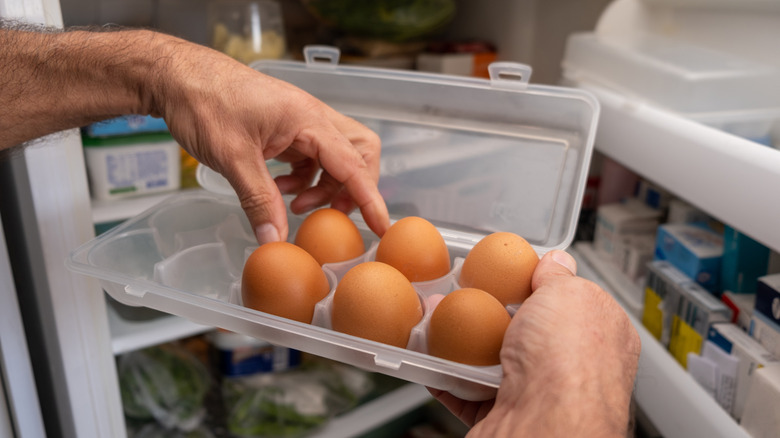Never Store Eggs In This Part Of Your Fridge (Here's Why)
Egg storage is important for maintaining the taste and quality of the product, and while the refrigerator is the go-to, not all parts of it are equally effective. Eggs should not be kept in the door of the fridge in order to limit temperature fluctuations that can accelerate bacterial growth.
The FDA notes that the ideal temperature for egg storage is 40 degrees Fahrenheit or lower. This range is the standard for most fridges, but consistency in temperature is as imperative. It is preferable to store eggs in the coolest part of your refrigerator, usually toward the back of a shelf where the temperature is the most stable. The door bears the brunt of temperature variation thanks to the hot air that floods in when opened.
It is important to note that while opening the fridge results in warm air entering and heating the entire fridge, the food itself does not undergo such rapid warming in short bursts. Still, if the door is left open for long enough, or opened repeatedly throughout the day, this intruding hot air can eventually affect the quality of the food in the door.
Eggs are particularly susceptible to temperature changes because their shells are porous, so warm air can pass through. Once the eggs are at temperatures above 40 degrees Fahrenheit, bacteria can form and also easily permeate past the shells, which leads to spoiling.
How to maintain the freshness of your eggs
Farm fresh and store-bought eggs have different storage considerations. Eggs from the store require immediate refrigeration thanks to USDA regulations on washing and sanitizing. Eggs contain a natural protective coating called bloom, which is lost in this process, thus leaving the products open to bacteria. Farm fresh eggs, on the other hand, retain this layer and are therefore able to sit on your counters for a couple of weeks, so long as they remain unwashed. Also, in their original condition, these eggs can be stored in the fridge for around three months.
If you bought your eggs in a carton, it's best to keep them there, with the pointier side of the egg on the bottom. Due to their porous shells, eggs may absorb the smell and taste of strong-smelling foods, so these items should be stored away from one another. The risk is not only cross-contamination, but simply altering the flavor or odor of eggs can degrade the overall quality, even leading you to incorrectly think that they are spoiled, and thus discard the whole carton.


